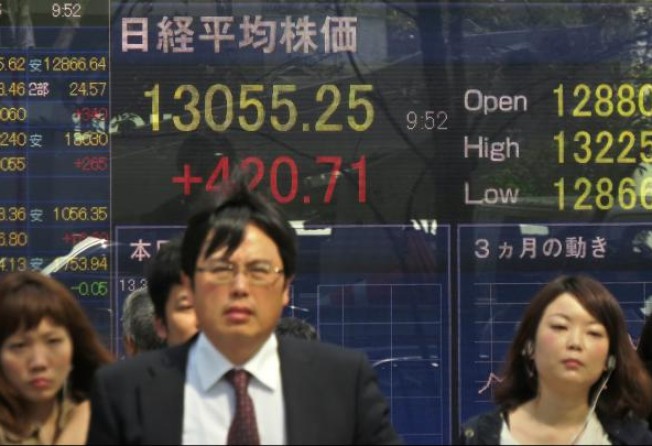Tokyo stocks skyrocket on BoJ easing plan

Tokyo stocks skyrocketed on Friday as investors embraced sweeping new monetary easing measures from the Bank of Japan that sent the yen plunging, spelling good news for the country’s struggling exporters.
The scope of the BoJ action on Thursday -- including doubling the money supply -- took some analysts and investors by surprise, despite expectations of major moves by the central bank in its first meeting under new management.
The yen slumped against the dollar and euro after Thursday’s announcement, the benchmark Nikkei jumped and bond yields hit a record low as new BoJ governor Haruhiko Kuroda vowed no let-up in the battle against deflation.
In early Friday trade, Tokyo’s Nikkei 225 index was up 4.68 per cent, or 591.08 points, to 13,225.62, touching intraday levels last seen in August 2008 and the yen weakened further in Asia.
By 0140 GMT, the benchmark index was still up 3.56 per cent while the broader Topix index of all first-section shares had climbed 4.12 per cent, or 42.82 points, to 1,080.49.
The jump marks a big bet from investors who have so far given the thumbs up to the economic policies of Prime Minister Shinzo Abe after he swept December elections on a pledge to kickstart Japan’s struggling economy.
“Japanese stocks had long been undervalued, so the gain is justified,” said Daisuke Uno, chief market strategist of Sumitomo Mitsui Banking Corp.
“But we also need to keep an eye on the downside of the fresh easing measures.... We don’t know where this gamble will take us.”
Abe Friday applauded the action by the central bank, with local media quoting him as saying the market reaction was “exactly what the measures were expected to do”.
Monetary easing tends to weaken a national currency, which makes Japanese goods more competitive overseas and lifts companies’ foreign-earned profits when converted back to yen.
In Tokyo forex trade, the dollar crept above the 97-yen level before settling back at 96.78 yen from 96.33 yen the previous day in New York and way up from 92.71 yen on Thursday morning trade before the BoJ announcement.
The euro bought 125.20 yen from 124.60 yen in US trading.
“The increased appeal of Japanese shares to potential overseas investors, combined with renewed weakening of the yen should lift the market still higher,” SMBC Nikko Securities general manager of equities Hiroichi Nishi told Dow Jones Newswires.
The BoJ plans to expand its asset-purchase programme to include riskier bets such as exchange-traded funds (ETFs) and real-estate investment trusts. ETFs are similar to an index fund, but are market traded like stocks.
It will also buy longer-term government bonds, a move aimed at pushing down long-term interest rates to encourage companies and individuals to borrow instead of hoarding their cash.
The bank said it wanted to boost the monetary base -- the amount of currency in circulation including commercial bank deposits in BoJ reserves -- by 60-70 trillion yen (HK$4.9 trillion to HK$5.7 trillion) annually to 270 trillion yen (HK$22.1 trillion) by the end of next year.